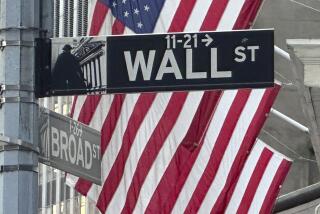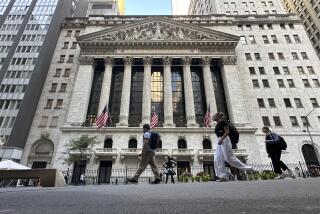Top Economic Gauge Drops for 2nd Month : Forecast: The index of leading indicators was down 0.8% in September. Three consecutive declines usually signal a recession.
WASHINGTON — The government’s chief economic forecasting gauge dropped 0.8% in September, the government said today, for its second straight monthly drop.
The September drop followed a 1.2% plunge in August, the steepest since a 1.4% fall a month after the October, 1987, stock market crash. The index was unchanged in July.
Three consecutive declines in the Commerce Department’s index of leading economic indicators are viewed as a fairly reliable--although not infallible--sign that a recession is imminent.
There has not been a recession since World War II without the index turning down for at least three consecutive months. However, the index was negative for six months in 1984 and for five months in 1987-88 and, both times, the economy escaped a recession.
Many economists who believe that the nation’s economy is in a recession are now debating how long it will last and how severe it will be.
Even those analysts who say the economy still can skirt a recession generally agree that the current quarter is in a contraction. A recession generally is defined as two straight quarters of negative growth.
Nine of the forward-looking indicators pulled the index down in September.
They were lower stock prices, a decrease in orders for consumer goods, an increase in weekly unemployment claims, a decline in building permits, a drop in an index measuring consumer confidence, a decrease in unfilled orders, a lower money supply, faster business delivery times and a decline in the price of raw materials.
The only positive contributor was an increase in orders for new plants and equipment.
One indicator, the average workweek, was unchanged.
The various changes left the index at 143.3% of its 1982 base of 100 and down 1.1% from its level a year ago.
Many analysts who contend that a recession will be avoided still express concern that the economy may have weakened during the current quarter.
Michael Boskin, chairman of President Bush’s Council of Economic Advisers, said, “We are concerned about a sluggish fourth quarter and the early part of 1991.”
Stephen S. Roach, senior economist at Morgan Stanley & Co. of New York, believes that the economy will avoid a recession, although he projects a decline in growth during the current quarter.
More to Read
Inside the business of entertainment
The Wide Shot brings you news, analysis and insights on everything from streaming wars to production — and what it all means for the future.
You may occasionally receive promotional content from the Los Angeles Times.










